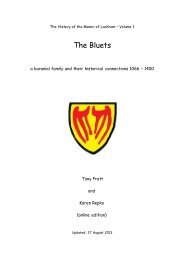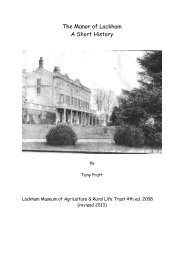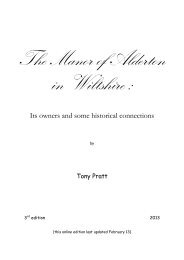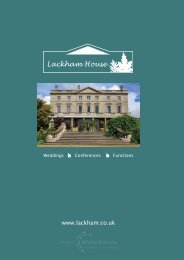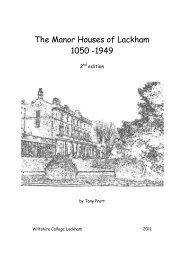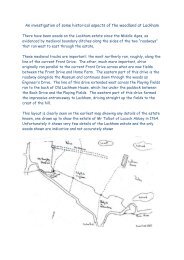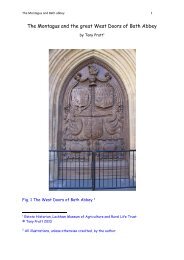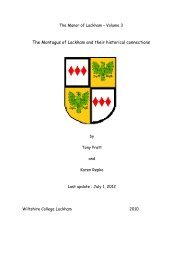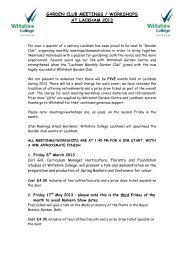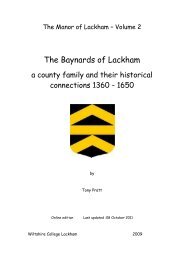History of Agricultural Education in Wiltshire - Lackham Countryside ...
History of Agricultural Education in Wiltshire - Lackham Countryside ...
History of Agricultural Education in Wiltshire - Lackham Countryside ...
You also want an ePaper? Increase the reach of your titles
YUMPU automatically turns print PDFs into web optimized ePapers that Google loves.
organise relevant courses for all grades with<strong>in</strong> their assoc<br />
iation, both short residential courses and correspondence<br />
courses.<br />
The centralisation <strong>of</strong> the milk operatives courses was not achieved before 1968/69, the<br />
mach<strong>in</strong>ery courses <strong>in</strong> 1969/70. The course for Corn Merchants was abandoned after the<br />
1965/66 session.<br />
A member <strong>of</strong> the Extra Mural staff, Mr J M Woodcraft, felt strongly that it would be <strong>in</strong><br />
the students' <strong>in</strong>terests to <strong>in</strong>clude much more practical work <strong>in</strong> the day courses <strong>in</strong><br />
Agriculture than had been the case hitherto. Thus <strong>in</strong> 1966, two pilot schemes were launched<br />
which allowed the classes at Mere (Mr Woodcraft) and Marlborough (Mr Chamberl<strong>in</strong>)<br />
centres to be given a total <strong>of</strong> n<strong>in</strong>e days practical <strong>in</strong>struction <strong>in</strong> a course <strong>of</strong> some twentyfour<br />
days. • Added to this was a one week residential course <strong>in</strong> January 1967 to give<br />
<strong>in</strong>struction <strong>in</strong> Animal Husbandry subjects and Milk<strong>in</strong>g Techniques. The success <strong>of</strong> this early<br />
venture was ample reward for the difficulties <strong>of</strong> staff<strong>in</strong>g and servic<strong>in</strong>g. The lessons<br />
learned helped to improve both these and the more traditional courses over the next year<br />
or two until the traumatic birth <strong>of</strong> the <strong>Agricultural</strong> Tra<strong>in</strong><strong>in</strong>g Board - this caused County Hall<br />
to reconsider the fee and raise it from £1 12s. Od. to £21. Thus we withdrew to a more<br />
traditional course. The obvious advantages <strong>of</strong> the practical course <strong>in</strong> enabl<strong>in</strong>g students to<br />
ga<strong>in</strong> a better understand<strong>in</strong>g <strong>of</strong> the pr<strong>in</strong>ciples <strong>of</strong> the subject were felt keenly by staff<br />
try<strong>in</strong>g to enthuse students amongst the distractions <strong>of</strong> a Technical College, dusty scout<br />
huts and village halls. Thus <strong>in</strong> 1972 it was felt politically right to centralise classes for Day<br />
Release students <strong>in</strong> Agriculture and Horticulture at <strong>Lackham</strong> College. Special buses were<br />
provided. Students who now attend these classes (1975) are able to benefit from the<br />
college farm and the workshop facilities as well as the expertise <strong>of</strong> staff not formerly<br />
available.[i]<br />
EVENING CLASSES (AGRICULTURE)<br />
In 1965/66, a very wide range <strong>of</strong> courses were <strong>of</strong>fered, some long term and some short.<br />
The subjects <strong>of</strong>fered <strong>in</strong>cluded Weld<strong>in</strong>g, Beekeep<strong>in</strong>g, Animal Health, Records and Accounts,<br />
Grassland etc. This pattern was repeated <strong>in</strong> 1966/67 and attracted a total <strong>of</strong> 192 students,<br />
plus a further 23 on Farm Management. A similar pattern was employed for Horticulture.<br />
Whilst this picture appears quite healthy, many courses were <strong>of</strong>fered which found no<br />
takers. The <strong>in</strong>fluence <strong>of</strong> Farmers' Clubs which were becom<strong>in</strong>g a very important feature <strong>in</strong><br />
the county, <strong>of</strong> television and <strong>of</strong> the <strong>in</strong>creas<strong>in</strong>g variety <strong>of</strong> classes <strong>in</strong> alternative subjects<br />
provided by the Adult <strong>Education</strong> Service may have been contributory factors to the decl<strong>in</strong>e<br />
<strong>in</strong> popularity <strong>of</strong> these classes. The most important reason must have been the advent <strong>of</strong> the<br />
A.T.B.<br />
The <strong>Agricultural</strong> Tra<strong>in</strong><strong>in</strong>g Board was resisted <strong>in</strong> <strong>Wiltshire</strong> for its first two to three years.<br />
Eventually it was accepted and the <strong>in</strong>fluence which it has, has been widely felt. With its<br />
extensive f<strong>in</strong>ance it is able to (and <strong>in</strong>deed required to) <strong>in</strong>itiate and pay for very expensive<br />
Industrial Tra<strong>in</strong><strong>in</strong>g Courses. <strong>Lackham</strong> College has been able to participate <strong>in</strong> this programme



